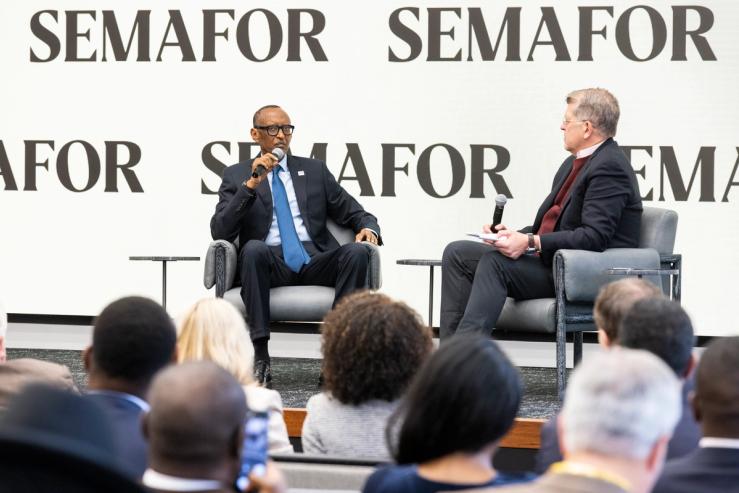The Scoop
Rwanda’s President Paul Kagame, in an interview with Semafor, suggested there is a way to move forward on the possible release of activist Paul Rusesabagina, who came to prominence after his portrayal in the Hollywood movie Hotel Rwanda.
Just three months ago, at the Semafor Africa Summit in Washington DC, Kagame pushed back strongly at what he described as “bullying” by U.S. authorities and other human rights organizations. Concerns had been raised after Rusesabagina, 68, was sentenced by a Rwandan court in 2021 to 25 years in prison on eight terrorism charges tied to an organization opposed to Kagame’s rule.
Kagame told Semafor’s Steve Clemons that “there is work going on” to resolve the issue with Rusesabagina. “We’re not people who want to get stuck in one place and not make any movement forward,” the Rwandan president said during an interview at the Global Security Forum in Doha, Qatar.
“There is a discussion looking at all possible ways of resolving that issue without compromising the most fundamental aspects of that case and I think there’s always going to be a way forward,” said Kagame.
Rusesabagina’s family, who have campaigned for his release, declined to comment.
In this article:
Know More
Rusesabagina, who was portrayed as a hero in the movie Hotel Rwanda for protecting ethnic Tutsis from genocide, was sentenced along with 20 others. In May 2022, about a year after his first trial, Rusesabagina was designated as a “wrongful detainee” by the US State Department which also said the trial process had not been fair.
In December Kagame questioned why his country should release him just because of his fame or his status as a U.S. permanent resident.
“We will make it clear: There isn’t anybody going to come from anywhere to bully us into something to do with our lives and we accept it,” the Rwandan president said at the Semafor Africa Summit.
Rusesabagina has denied being responsible for alleged violence carried out by the National Liberation Front, which is the armed wing of the political group Rwanda Movement for Democratic Change which he leads.
Yinka’s view
This is a significant change of language for Kagame when it comes to the Rusesabagina issue. In the recent past Kagame has often pointed to the court case as being the final arbiter.
Now his tone has changed. As he told Steve, his country has in the past “forgiven the unforgivable.”
But if you take a step back it becomes easier to see why Kagame might want to get this out of the way sooner than later and also why he would want to do so “without compromising the most fundamental aspects” of the case.
There would have been concerns in Kigali with the designation of Rusesabagina, a U.S. permanent resident, as a “wrongful detainee”. It suggests his trial was a sham and adds Rwanda to an unappealing shortlist of countries including China, Russia, and Venezuela among others who have detained U.S. citizens wrongfully.
As we come up to the 29th anniversary of the Rwandan genocide next month it’s worth noting Rwanda has worked hard since then to be seen as a country which upholds the rule of law. The designation of “wrongful detainee” suggests otherwise.
The challenge here is that the government will no doubt want this to be resolved without effectively agreeing the court trial process was flawed and Rusesabagina will probably not want to be labeled as a freed ‘terrorist’.
Room for Disagreement
While parties close to the US government and others on Capitol Hill have been working quietly behind the scenes putting pressure on President Kagame to resolve this matter, this isn’t the reason there may have been some movement here, says Jeffrey Smith, founder of human rights advocacy organization Vanguard Africa.
“I would contend that the public pressure on the Kagame government, mainly from the Rusesabagina family, is what ultimately prompted Kigali to sit at the negotiating table,” says Smith, whose group repeatedly criticized Kagame’s human rights record. “This pressure — in the form of public advocacy, naming and shaming, and strategic global outreach — helped to create the space that was needed for a dialogue between Washington and Kigali.”
Notable
- Hotel Rwanda has ended up being a double edged sword for the government of President Paul Kagame. The film introduces the world to the atrocities committed but on the other hard some of the film’s historical inaccuracies helped build up Paul Rusesabagina’s profile.


